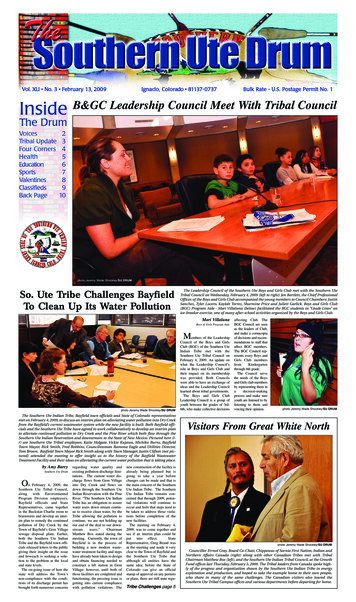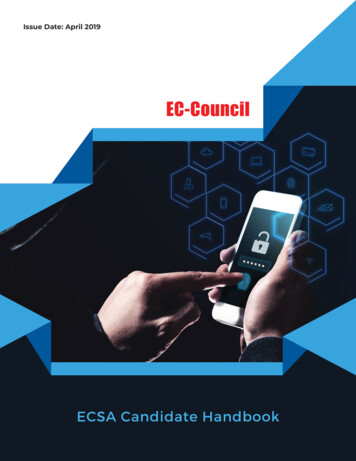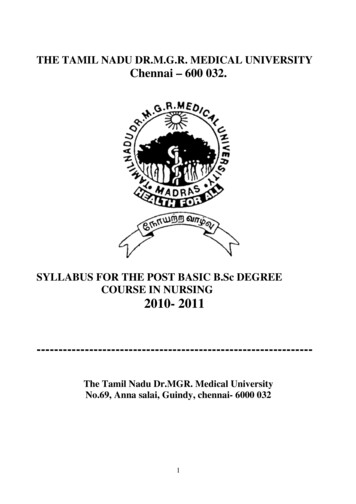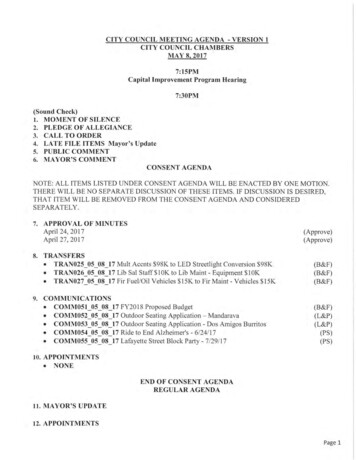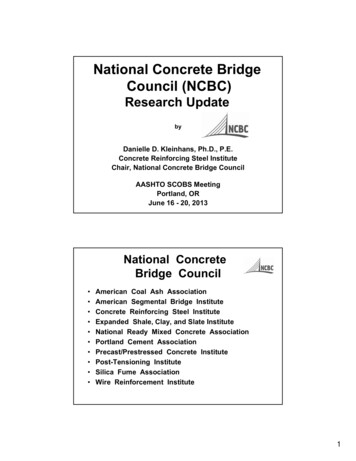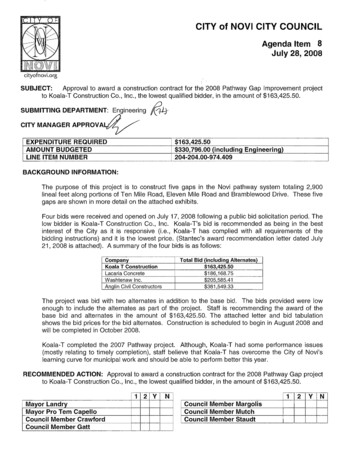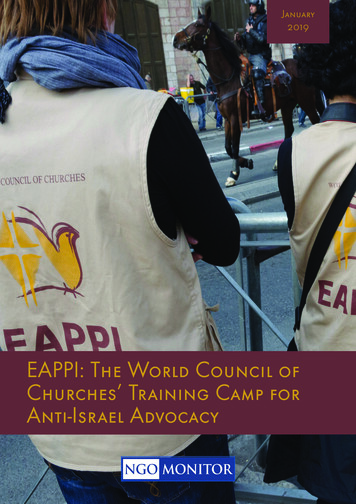
Transcription
January2019EAPPI: The World Council ofChurches’ Training Camp forAnti-Israel Advocacy
EAPPI: The World Council ofChurches’ Training Campfor Anti-Israel AdvocacyJanuary 2019NGO Monitor's mission is to provide informationand analysis, promote accountability, and supportdiscussion on the reports and activities of NGOsclaiming to advance human rights andhumanitarian agendas.10 Yad Harutzim St.Jerusalem, Israel 9342148Tel: 972-2-566-1020Fax: .orgInstitute for NGO Research (#580465508 )ע"ר Organization in Special Consultative Status with the UN Economic and Social Council since 2013 2018 NGO Monitor. All rights reserved.
EAPPI: A World Council of Churches’ Training Camp for Anti-Israel AdvocacyEXECUTIVE SUMMARY EAPPI, the World Council of Churches’ flagship project on the Arab-Israeli conflict,has brought 1,800 volunteers to the West Bank to “witness life under occupation.”The World Council of Churches does not run similar activities in other conflictzones. By singling out Israel, EAPPI embodies antisemitism, as defined in the International Holocaust Remembrance Association’s working definition.Despite marketing itself as human rights and protection program, EAPPI placessignificant emphasis on political advocacy before, during, and after the trip.When volunteers return to their home countries and churches, they engage in anti-Israel advocacy such as BDS (boycott, divestment, and sanctions) campaignsand comparing Israel to apartheid South Africa and Nazi Germany.Participants are selected by country-specific non-governmental organizations(NGOs) known as “National Coordinators.” The National Coordinators are alsoactive in BDS and other delegitimization campaigns against Israel.EAPPI receives funding from a variety of sources, including the WCC and National Coordinators. Funding from different governments is directed to EAPPI throughthe National Coordinators and via UNICEF.EAPPI contributes to a UN “Working Group” consisting of a number of UN agencies and NGOs that collaborate on and coordinate politicized anti-Israel campaigns in the West Bank. In this capacity, EAPPI does “a lot of administrative workwhich is fed into UN systems.”EAPPI partners with a number of political NGOs in the region, including groupsthat support BDS campaigns against Israel and/or that accuse Israel of “warcrimes.”The significant problems with EAPPI, as laid out in this report, should be seen in1light of the antisemitism and demonization that emerges from EAPPI’s parentbody (World Council of Churches), partners, and affiliated staff.RECOMMENDATIONSTo the donor governments - Act immediately to broadly reevaluate funding to EAPPI, in order toensure that these funds are not misused to promote antisemitism, BDS, and lawfare, and/or tofuel the conflict. Donor governments must develop and implement transparent funding guidelinesthat are accountable to the public.To the Israeli government - The Israeli government should develop a consistent, fact-based policyto deal with “delegitimization” campaigns, which it defines as a strategic threat. It should engagein critical dialogue with the government donors, as well as with the churches involved with EAPPI.To the WCC - If it desires to improve its image in Israel and with the global Jewish community, theWCC should not promote an ideology that denies Israel’s right to exist as a Jewish State and/orthat discriminates against Christian supporters of Israel.1See definitions of antisemitism from International Holocaust Remembrance Alliance (IHRA) and in a June 1, 2017European Parliament resolution.1
EAPPI: A World Council of Churches’ Training Camp for Anti-Israel AdvocacyI. OVERVIEW AND THE CENTRALITY OF ADVOCACYFounded in 2002, Ecumenical Accompaniment Programme in Palestine and Israel (EAPPI) is theGeneva-based World Council of Churches’ (WCC) “flagship project” on the Arab-Israeli conflict.2EAPPI’s stated mission is to “witness life under occupation, engage with local Palestinians andIsraelis pursuing a just peace, to change the international community’s involvement in the conflict,urging them to act against injustice in the region.” The program brings international activists,referred to as “Ecumenical Accompaniers” (EAs), to the West Bank; the EAs apparently enter Israelwith tourist visas. In the past 15 years, EAPPI has brought 1,800 EA volunteers on the program.The WCC’s EAPPI program consists of a “continuous presence of 25-30 EcumenicalAccompaniers on the ground, for periods of three months in accompanying, offering protectivepresence, and witness monitoring and reporting human rights abuses standing with localpeace and human rights groups and advocacy.” According to WCC’s International Coordinatorfor EAPPI Dr. Owe Boersma, the monitoring component includes “a lot of administrative workwhich is fed into UN systems” (emphasis added). EAPPIs from some or all countries are providedwith a living allowance (for food, short travel, etc.); round-trip airfare from their host country;communications expenses; and accident, travel, and medical insurance.3German EAPPI activist monitoring Israeli soldiersPhoto from EAPPI Germany website: zt/Upon first arriving in Israel, EAs are “provided with a training of about 10 days in Jerusalem priorto their placement.” These Jerusalem-based sessions include “training for advocacy uponreturning to home country.” After, activists are placed in “East Jerusalem, Qalqylya/Tulkarem,Jericho, South Hebron Hills, Hebron, Bethlehem and Yannoun.” EAs are also located atcheckpoints, and points of friction between Israelis and Palestinians and between Palestinians andthe IDF – including in the Old City of Jerusalem.2Jeff Halper, co-founder and former director of the Israeli NGO ICAHD, claims to have been one of the founders ofEAPPI in Geneva. In 2015, ICAHD was closed due to a court order. The Israeli Registrar of Non-Profits filed an order todismantle the organization following ICAHD’s failure to report donations from foreign political entities, failure to fileannual reports, lack of response to requests made by the Registrar, illegal use of the name of the organization, and thelack of reporting names of board members.3Document on file with NGO Monitor. EAPPI, “Role description for, and qualities sought in Ecumenical Accompaniers.”2
EAPPI: A World Council of Churches’ Training Camp for Anti-Israel AdvocacyAt the end of their volunteer service, EA’s participate in a “two day debriefing including groupdiscussion, evaluation of the programme, storytelling and preparation for cultural re-entry as wellas tips for public speaking & advocacy.”EAPPI’s “extensive advocacy” includes sharing “first-hand experiences to open the eyes of theircommunities, churches and governments to the realities of occupation.” According to EAPPI,advocacy includes both work in Israel “and back in our home countries Advocacy is the tool forincreasing international action for change. We share eyewitness testimonies with faith leaders,decision makers, media, civil society, and business officials, so that they change publicpolicy.Increased international awareness increases pressure on the perpetrators of human rightsabuses and helps protect civilians from these abuses” (emphasis added). Accordingly, many EAsparticipate and lead BDS (boycott, divestment, and sanctions) campaigns against Israel upontheir return to their home countries.II. ORGANIZATIONAL STRUCTUREWCCEAPPI is a project of WCC and therefore reflects its ideology and theology. This includes supportfor “an international boycott of goods and services from illegal Israeli settlements in the OPT,”encouraging “member churches to avoid investments or other economic links to illegal activitieson occupied territory,” promoting the 2009 Kairos Palestine document,4 and combating ChristianZionism.5Furthermore, top WCC officials have denied the ties of modern Israel to Jewish history in the landof Israel and have compared Israel to apartheid South Africa and Nazi Germany. On June 20,2017, at the “Bethlehem Consultation on 50 Years of Occupation,” the WCC’s general secretaryDr. Olav Fykse Tveit stated, “I heard about the occupation of my country during the five years ofWorld War II as the story of my parents. Now I see and hear the stories of 50 years ofoccupation ” (emphasis added). This type of language falls within the definition of antisemitismissued by the International Holocaust Remembrance Alliance and adopted by the EuropeanParliament on June 1, 2017.At an August 2015 “Israel: Palestinian Christian Perspective” conference, promoted by the BDSMovement, WCC’s co-moderator of Palestine Israel Ecumenical Forum (PIEF) (see below) RobertSmith stated, “Christian theology that support Zionism is heresy. Such Christian theology thatsupport Zionism is a false teaching that must be confronted it is essential for all of us to4The Kairos Palestine document calls for BDS against Israel, denies the Jewish historic connection to Israel in theological terms, and blames Israel alone for the continuation of the conflict. The Kairos document also includes justificationof terrorism against Israeli citizens, calling it “legal resistance”: “Some (Palestinian) political parties followed the way ofarmed resistance. Israel used this as a pretext to accuse the Palestinians of being terrorists and was able to distort thereal nature of the conflict, presenting it as an Israeli war against terror, rather than an Israeli occupation faced by Palestinian legal resistance aiming at ending it” (emphasis added). It additionally states that the “roots of ‘terrorism’ arein the human injustice committed and in the evil of the occupation.” The co-author of the Kairos Palestine document,Rifat Odeh Kassis, was EAPPI’s international coordinator and project manager from 2005-2007.5For example, its central committee meeting in Trondheim, Norway, which took place on June 22-28, 2016, called on“WCC member churches, specialized ministries and ecumenical partners to recognize Christian Zionism as a form ofChristian fundamentalism endangering especially indigenous Palestinian Christian communities.”3
EAPPI: A World Council of Churches’ Training Camp for Anti-Israel Advocacyunderstand that the Israel of the bible the ancient Israelites are not link in any substantive ormaterial way to the contemporary modern state of Israel the Israeli society is full with racismand light skin privilege ” (emphasis added).In addition, on Sep 15, 2016, Tveit and Jim Winkler (National Council of the Churches of Christin the USA), issued a statement arguing that “we see parallels between the crisis in Israel andPalestine and the struggles for racial justice in the United States and the anti-apartheid struggle inSouth Africa.One cannot keep an entire people subject to pressure and violence for many yearsand not expect a violent reaction. We do not endorse violence, but we know people are losinghope and faith in the efficacy of nonviolent means” (emphasis added).WCC’s Co-moderator of PIEF Robert Smith speaks at a BDS conference in South Africa.Screenshot from BDS South Africa Youtube video, September 27, 2015:https://www.youtube.com/watch?v etTBIHHYq6MCoordination of the WCC-EAPPI program is carried out by a team in Geneva under the WCC’s“Peacebuilding section of the Public Witness and Diakonia programmatic area,” headed by Rev.Dr. Owe Boersma. 6 Recruiting, training, and advocacy coordination are done by 22 countryspecific church-based frameworks, known as “National Coordinators.” For instance, in the UKand Ireland, EAPPI is administered by the Quakers in Britain on behalf of 16 partnerorganizations, which include church groups and NGOs such as CAFOD, Christian Aid, PaxChristi UK, and Trocaire; in Denmark, EAPPI is administered by DanChurchAid; in Norway byNorwegian Church Aid; in Switzerland by HEKS EPER and Peace Watch Switzerland; and inNetherlands by Kerk in Actie.Some National Coordinators’ grantees and partners are involved in political campaigns againstIsrael (see below).EAPPI does not have “formal legal registration within the country of operations [Israel],” butrather a “locally registered nongovernmental organization acts as custodian” for the program.6Rev. Dr. Owe Boersma, based in Geneva, has been the international coordinator of WCC-EAPPI since September2016. The position was previously held by Manuel Quintero, who served in the role for eight years.4
EAPPI: A World Council of Churches’ Training Camp for Anti-Israel AdvocacySpecifically, EAPPI operates out of the Jerusalem Inter Church Centre’s (JIC) office. According toEAPPI’s website, JIC, headed by Yusef Daher (see below), also provides “guidance andcoordination with the local churches.”A number of local Israeli and Palestinian NGOs constitute EAPPI’s “Local Reference Group (LRG),”which “provides guidance, advice and support to the WCC-EAPPI staff and NationalCoordinators strengthening relations with the local churches and local partner organizations, aswell as promoting the WCC’s EAPPI at local and national levels The LRG meets regularly,supervising the programme and ensuring its alignment at all times with the WCC’s objectives.”Dr. Zoughbi Zoughbi, founder and director of the political NGO W’iam, serves as EAPPI’sSecretary and interim Local Programme Coordinator.National CoordinatorsEAs are recruited and sent from countries where the program has “established a nationalcoordination office” 7 (see here for sample application form). These National Coordinators areresponsible for a number of activities, including recruiting “volunteers” (EAs), covering some or allof the costs of the program (depending on the country), and conducting pre-trip orientations. Forexample, prior to Norwegian participants’ trip, EAs learned about the “Israeli-Palestinian conflicthistory and current situation, the religious dimension, international humanitarian law, program,locations, security, team issues, contact with media ” In Denmark, according to Dan ChurchAid’s 2015 report, EAs were provided with “learning material, including training videos onvolunteering and reporting mechanisms for human rights violations.”National Coordinators are also responsible for follow-up and post-trip “advocacy and awarenessbuilding work.” EAPPI explains that this is an “essential part of the program” and that theNational Coordinators “have different expectations for the number of articles being producedduring the stay as well as public speaking engagements upon return. Volunteers with specificskills like video filming or photographing might want to produce exhibitions or documentaries incooperation with their national coordination.”In Norway, for example, Norwegian Church Aid (NCA) “coordinates the Norwegian contributionand is responsible for recruitment, training, deployment and follow-up of 16 EcumenicalAccompaniers (EAs) annually.” Former EAPPI advocacy officer Nader Hanna explained that “NCAis also involved in recruitment, which is the most important. So they (NCA), they’re advertised –they do interviews, they receive applications, they do tests, and they also test them before theycome here. And when they go back home, NCA is also coordinating their advocacy efforts backhome NCA is funding, and facilitates so that candidates are able to come and participate in thisprogram.”FundingIn 2017, WCC allocated 1.3 million to EAPPI. Of this, 803,000 was spent on EcumenicalAccompaniers from Austria, Australia, Germany, Switzerland, Denmark, the UK, Ireland, Norway,If an applicant does not have a national coordination in his/her country they are asked to contact the “AreaRepresentative Middle East Norwegian Church Aid c/o Jerusalem Inter Church centre.”75
EAPPI: A World Council of Churches’ Training Camp for Anti-Israel AdvocacySweden, Finland, and the US, and in partnership with UN bodies.According to NGO Monitor research, most funding to EAPPI is allocated from local church basedNGOs to WCC, for use by EAPPI. Examples of this type of funding include: The Swiss church NGO HEKS provided CHF 300,000 in 2018 and CHF 225,000 toEAPPI in 2016. In 2015, 24% of HEK’s funding came from government sources in Switzerland. According to UNOCHA, it appears that in 2018 HEKS provided 56,615 to ACT Alliance / Dan Church Aid – Norwegian Church Aid Joint office in Palestine for an EAPPIproject.The British church NGO CAFOD granted 25,000 in 2018 and 30,000 in 2017 toQuaker Peace and Social Witness for use by EAPPI (see below). In 2015-2016, CAFODreceived funding from the EU, UK, and Ireland.In 2017-2019, EAPPI will receive DKK 328,995 from DanChurchAid (Denmark) and in2014-2016, it received DKK 281,451. DanChurchAid receives funding from Denmarkand the EU.In 2018, ACT Alliance / Diakonie Austria provided 10,112, ACT Alliance / Finn ChurchAid provided 97,638, ACT Alliance / Norwegian Church Aid provided 64, 038, andACT Alliance / United Church of Canada provided 7,464 to ACT Alliance / Dan ChurchAid – Norwegian Church Aid Joint office in Palestine for an EAPPI project. Research also shows that there is funding for EAPPI that is external to WCC, with a significantportion originating with or being channeled to National Coordinators. The extent to which thisfunding is reflected in WCC’s financial documents is unknown.NGO Monitor research also notes the following government funding to EAPPI:Norway EAPPI is considered to be the “main project” of Norwegian Church Aid’s (NCA)“Faith Communities and Peace Building program in Israel-Palestine.”8 This NCAprogram is funded by the Norwegian Ministry of Foreign Affairs and its Sectionfor Humanitarian Affairs.In 2017-2018, the Norwegian Ministry of Foreign Affairs provided NOK4,052,534 to NCA for EAPPI.From 2011-2015, Norway provided NOK 13.7 million to EAPPI and its partnerRabbis for Human Rights.Support to WCC “plus funding for EAPPI” in 2015 was NOK 2.6 million.In addition, according to UN-OCHA’s reporting system, in 2015 the Norwegiangovernment granted 287,323 via Save the Children to several organizationsand implementing partners, including EAPPI, as well as YMCA, Ma’an Development Center, and the Palestinian Center for Democracy and Conflict Resolution(PCDCR).Sweden 86The Swedish Mission Council Humanitarian Framework, which is a recipient of76% of its funding is provided by the Norwegian Ministry of Foreign Affairs.
EAPPI: A World Council of Churches’ Training Camp for Anti-Israel Advocacy Swedish government funding, states that EAPPI will receive SEK 6 million per yearin 2017-2019 (totaling SEK 18 million).In 2013-2015, the Swedish government (Swedish International Development Cooperation Agency) transferred 2.5 million to the Swedish Council of Churchesfor EAPPI ( 711,803 in 2015; 874,648 in 2014; 921,206 in 2013).Germany “Bread for the World supports this EAPPI program with ecclesiastical funds, with acontribution to the shared costs of the Geneva office and the cost of preparingand posting 10-15 volunteers from Germany.” Bread for the World receives extensive funding from the German government.Finland In 2015, Finn Church Aid noted that the Finish MFA was the primary fundingsource for EAPPI’s Global Coordination Project, providing 122,000 for its“Common Responsibility Campaign.” According to Finn Church Aid’s 2015 Annual report, FCA sent 10 EAs on the program with the support of the FinnishMFA. Three EAs were supported by UNICEF for EAPPI’s work on “access to education.”In 2013, Finland granted 222,673 to the “Swedish Ecumenical AccompanimentProgramme in Palestine and Israel” (via FEAPPI/Finn Church Aid).UNICEF Since 2013, UNICEF has channeled extensive donor-government funds to EAPPIfor a project “Protected and safe access to schools as an emergency response forvulnerable communities in the oPt.”In 2016-2017, EAPPI and CPT received 751,853 for implementing UNICEF’s“safe schools” project.According to UN-OCHA, in 2015, Canada provided UNICEF with 790,514 fora project implemented by EAPPI and Christian Peacemaker Teams (CPT, see below).In 2015, Japan and UNICEF National Committee/France granted 486,799 viaUNICEF to several organizations as implementing partners, including EAPPI, aswell as Palestinian Center for Human Rights (PCHR), B’Tselem, War Child Holland,Defense for Children International - Palestine (DCI-P), Norwegian Refugee Council (NRC), OCHA, OHCHR, UNRWA, and others for a project “Informing humanitarian programmatic and advocacy response through documentation of grave violations against children affected by armed conflict.”In 2013, Japan provided 538,004 to UNICEF. EAPPI served as the implementingpartner “to provide protected and safe access to education for prioritized highlyvulnerable communities in the West Bank, including East Jerusalem, in which protection issues affect access to education.”Additionally, in 2018, EAPPI received two grants via the “occupied Palestinian territoryHumanitarian Fund” (oPt-HF), an “emergency pooled fund that supports the delivery of strategichumanitarian assistance to address priority needs, while retaining the flexibility to respondunforeseen emergencies or events”: EAPPI, together with Christian Peacemaker Teams (CPT),7
EAPPI: A World Council of Churches’ Training Camp for Anti-Israel Advocacyserved as implementing partners for a UNICEF project, receiving 244,558 to “To provideprotective presence and accompaniment to ensure safe access to education for vulnerable schoolchildren in the West Bank, including East Jerusalem.” oPt-HF also provided 249,999 to ACTAlliance / Dan Church Aid - Norwegian Church Aid Joint office in Palestine for a WCC-EAPPIproject, focused on providing “protective presence” in East Jerusalem “seeking to prevent childarrests.”III. POLITICAL ACTIVITY AND ADVOCACYNGO Monitor research has identified numerous activities and statements by EAs and other EAPPIaffiliates that demonstrate their support and involvement in activities that delegitimize Israel.EAPPI and its activists are known for inflammatory anti-Israel, and at times antisemitic, rhetoricand advocacy. In July 2012, Vivian Wineman, at the time the President of the UK Jewish Board ofDeputies, referred to EAPPI as “inflammatory and partisan its graduates return with simplisticand radical perspectives. Members of Jewish communities across the country have sufferedharassment and abuse at EAPPI meetings.”According to the UK Jewish Board of Deputies, EAPPI “helped to create a climate of hostilitytowards Israel within the Church of England.” Furthermore, “The EAPPI narrative is based on theexperience of volunteers who spend several months living alongside Palestinians in the Territories,but less than a day in Israel, and then return to address audiences who know little or nothingabout the reality of everyday life for those on both sides of the conflict.”For example, EAPPI’s core publication, “Faith under Occupation,” jointly published in 2012 withWCC and the Jerusalem Inter-Church Centre, places sole blame on Israel for the difficulties facedby Christians in the Holy Land. The document contains a list of recommendations including“protesting apartheid and colonization,” “sanctions and suspension of US aid to Israel,”“challenge Israel in local and international courts,” and “economic boycotts.”Ecumenical AccompaniersEcumenical Accompaniers (EAs) have made numerous inflammatory and factually inaccuratestatements, both during and following their participation in EAPPI. Blogs, presentations, publicstatements, and social media make these proclamations available to the public. 8During a September 2017 presentation on EAPPI given by an EA, Rev. Gordon Timbersof the Presbyterian Church of Canada, an audience member asked, “Excuse me; I have tomake a comment at this point. I don’t know how many people here have seen the modelof the gas chambers and some of these things really remind me [unintelligible] and Ioften wondered if any Jewish people who go in to see that model ever think of what is setup here” (emphasis added). In his answer, Timbers did not dispute the false claim, answering instead “ Thank you for that, because there are similarities. All these identitypapers and restriction of movement and checkpoints and all of these things, yes, thatdoes make people think.” (Video on file with NGO Monitor.)Another EA from Canada and a “long standing member of Amnesty International “ stated in a presentation that “There are signs all over the West Bank whenever a road leads
EAPPI: A World Council of Churches’ Training Camp for Anti-Israel Advocacy to area A which is where the PA has a full control it says that it’s illegal for Israelis to goon that road to go into that area. They are forbidden by law and it’s allegedly dangerousto their lives. Of course, I never felt the dangers at all. I suspected that the real reason forthe signs was to prevent the Israelis from seeing what was going on “ (0:15 – 1:01,emphasis added)On April 17, 2018, “A team minister” at St. Paul’s United Church in Riverview, NB, Canada who was volunteering with EAPPI in Bethlehem, wrote that “The ‘March of Return’ focuses on their rights, guaranteed under the Geneva Convention, to return to the land theirancestors have inhabited since before recorded history.The roots of the ‘March of Return’ go back to 1948, when faced with terrorist attacks by Israeli forces, 750,000 Palestinians fled some 600 villages and towns.”An EA cited in EAPPI’s 2013 report “Education Under Occupation” shared this virulentlyantisemitic image on her Facebook page:An EAPPI-Switzerland blog featured an interview with Manal Tamimi (June 10, 2017).Manal Tamimi frequently utilizes antisemitic and violent rhetoric and imagery on socialmedia. For example, on August 1, 2015, Tamimi tweeted “I do hate Israel ,i (sic) wish athrid Intefada (sic) coming soon and people rais (sic) up and kills all these zionist settlerseverywhere.” In September 2015, on Yom Kippur (a fast day and the holiest day of theyear in the Jewish calendar), Tamimi tweeted, “Vampire zionist celebrating their Keboreday by drinking Palestinian bloods, yes our blood is pure & delicious but it will kill u at theend.” The UN removed Tamimi from a report listing her as a “human rights defender” after NGO Monitor filed a complaint documenting her antisemitic and violent tweets.In 2016 in South Africa, EAPPI activists participated in Apartheid Week events in Pretoriaand in 2017 at Nelson Mandela University. BDS South Africa’s website also stated that aleading EAPPI activist participated in its Apartheid Week events. A South African EA whoparticipated in the program twice advocated for crippling the Israeli banking system,calling for “SWIFT [Society for Worldwide Interbank Financial Telecommunication] sanctions against Israel.” He stated that, “If we can develop the momentum of sanctions against Israeli banks then all the power of the Israeli military becomes irrelevant that’s really the basis to support the BDS program without access to SWIFT .thewhole economy would quickly collapse the time has come to say that the victims of the9
EAPPI: A World Council of Churches’ Training Camp for Anti-Israel AdvocacyHolocaust have now become the perpetrators” (emphasis added).EAPPI activist Itani Rasalanavho speaks at Israeli Apartheid Week in South Africa.Screenshot from BDS South Africa Youtube Video, April 14, 2016: https://www.youtube.com/watch?v cH3qJNAc6iU 10On February 6, 2014, four EAs participated in discussions of South African Parliament’sPortfolio Committee on International Relations and Cooperation, which “held a public forum to support the campaigns for equal treatment and the right to self-determination ofthe peoples of Palestine, Western Sahara and Cuba.” They noted, “We want completemilitary, diplomatic and financial sanctions against Israel until it complies with all applicable UN resolutions and international law, and ends the occupation.”In London, in May 2016, an EAPPI activist discussed the experience she had in Hebron.During her presentation, she blamed the “Jewish lobby” and its influence in the US as anexplanation for “why Evangelical Christians are not as sympathetic to the Palestinianplight.” She also supported a Palestinian “right of return,” called for a complete boycott ofproducts and services from Israel, and referred to Israeli killing of Palestinian terrorists inHebron “that supposedly had knives, but there are videos that show they have beenplanted.”An Austrian EA, Irene Benitez, is quoted in an article on the Austrian sending organizationDiakonie’s website. In the article about EAPPI’s program, Irene accuses the IDF and Israelicivilians of “regularly” carrying out “attacks” against “the Palestinian population.” (NGOMonitor translation from original German). Diakonie concluded that “Benitez, like her colleagues before, will contribute to the enlightenment in Austria regarding the tense situation in Palestine. She is planning lectures in parishes, schools and congregations and isavailable for interviews, which we are happy to provide.” (NGO Monitor translation fromoriginal German).On June 18, 2017, an EA from England (who participated in EAPPI from April to July2016) gave a presentation “EYE-WITNESS - Stories from the West Bank & Israel” at achurch in Liverpool. The EA discussed the “Bedouin community called Jabel ababa” andclaimed that the “Israeli government is trying to force a relocation plan on all Bedouincommunities and to make them move into townships does that ring a bell somewhereback to South Africa? Strongly reminds me of what the British did to the Aboriginals some200 years ago, and what about what happened to the native Indians in the USA ataround the same time ” According to statistics only 2% of Palestinians support violenceas part of the solution to the conflict ” He added that “the Israeli government is set onnot allowing any greater proportion of
of Israel and have compared Israel to apartheid South Africa and Nazi Germany. On June 20, 2017, at the "Bethlehem Consultation on 50 Years of Occupation," the WCC's general secretary Dr. Olav Fykse Tveit stated, "I heard about the occupation of my country during the five years of World War II as the story of my parents.


